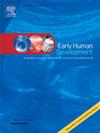Protective influence of heatwave activity on pregnancy duration
IF 2.2
3区 医学
Q2 OBSTETRICS & GYNECOLOGY
引用次数: 0
Abstract
This study investigates the impact of heatwave exposure on pregnancy duration, offering new insights into the complex relationship between environmental heat stress and gestational outcomes. Using data from over 3170 singleton pregnancies in Poland (2013−2020), we applied Cox proportional hazards models to estimate the risk of delivery associated with heatwave exposure during various stages of pregnancy. The proportional hazards assumption was tested using Schoenfeld residuals and found to be violated for key covariates, prompting the use of time-varying and stratified modeling to ensure robustness.
Our findings challenge the prevailing view that heatwaves are uniformly harmful during pregnancy. We observed a consistent association between heatwave exposure and prolonged gestational duration, along with a reduced risk of preterm birth, even during late gestation. These protective effects were particularly evident among pregnancies complicated by maternal conditions such as hypothyroidism, diabetes, and advanced maternal age. Sensitivity analyses supported the stability of these associations, and model diagnostics confirmed the validity of the adjusted models.
These results support emerging evidence that moderate environmental stressors may activate compensatory physiological responses, promoting fetal development and delaying delivery. In the context of climate change, understanding both the risks and adaptive potential of heat exposure is essential for guiding obstetric care and public health strategies.
热浪活动对妊娠期的保护作用
本研究探讨了热浪暴露对妊娠持续时间的影响,为环境热应激与妊娠结局之间的复杂关系提供了新的见解。使用波兰3170例单胎妊娠(2013 - 2020)的数据,我们应用Cox比例风险模型来估计妊娠不同阶段与热浪暴露相关的分娩风险。使用Schoenfeld残差对比例风险假设进行检验,发现关键协变量违反了比例风险假设,因此需要使用时变和分层建模来确保稳健性。我们的发现挑战了流行的观点,即热浪在怀孕期间都是有害的。我们观察到热浪暴露与妊娠期延长以及早产风险降低之间的一致关联,即使在妊娠后期也是如此。这些保护作用在伴有甲状腺功能减退、糖尿病和高龄的孕妇中尤为明显。敏感性分析支持了这些关联的稳定性,模型诊断证实了调整后模型的有效性。这些结果支持了新出现的证据,即适度的环境压力可能激活代偿性生理反应,促进胎儿发育和延迟分娩。在气候变化背景下,了解热暴露的风险和适应潜力对于指导产科护理和公共卫生战略至关重要。
本文章由计算机程序翻译,如有差异,请以英文原文为准。
求助全文
约1分钟内获得全文
求助全文
来源期刊

Early human development
医学-妇产科学
CiteScore
4.40
自引率
4.00%
发文量
100
审稿时长
46 days
期刊介绍:
Established as an authoritative, highly cited voice on early human development, Early Human Development provides a unique opportunity for researchers and clinicians to bridge the communication gap between disciplines. Creating a forum for the productive exchange of ideas concerning early human growth and development, the journal publishes original research and clinical papers with particular emphasis on the continuum between fetal life and the perinatal period; aspects of postnatal growth influenced by early events; and the safeguarding of the quality of human survival.
The first comprehensive and interdisciplinary journal in this area of growing importance, Early Human Development offers pertinent contributions to the following subject areas:
Fetology; perinatology; pediatrics; growth and development; obstetrics; reproduction and fertility; epidemiology; behavioural sciences; nutrition and metabolism; teratology; neurology; brain biology; developmental psychology and screening.
 求助内容:
求助内容: 应助结果提醒方式:
应助结果提醒方式:


